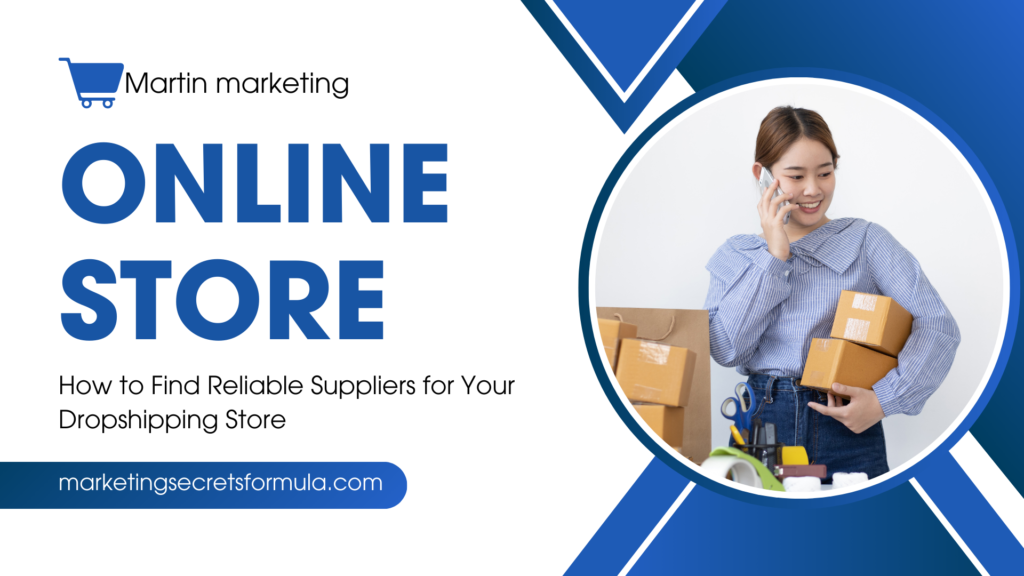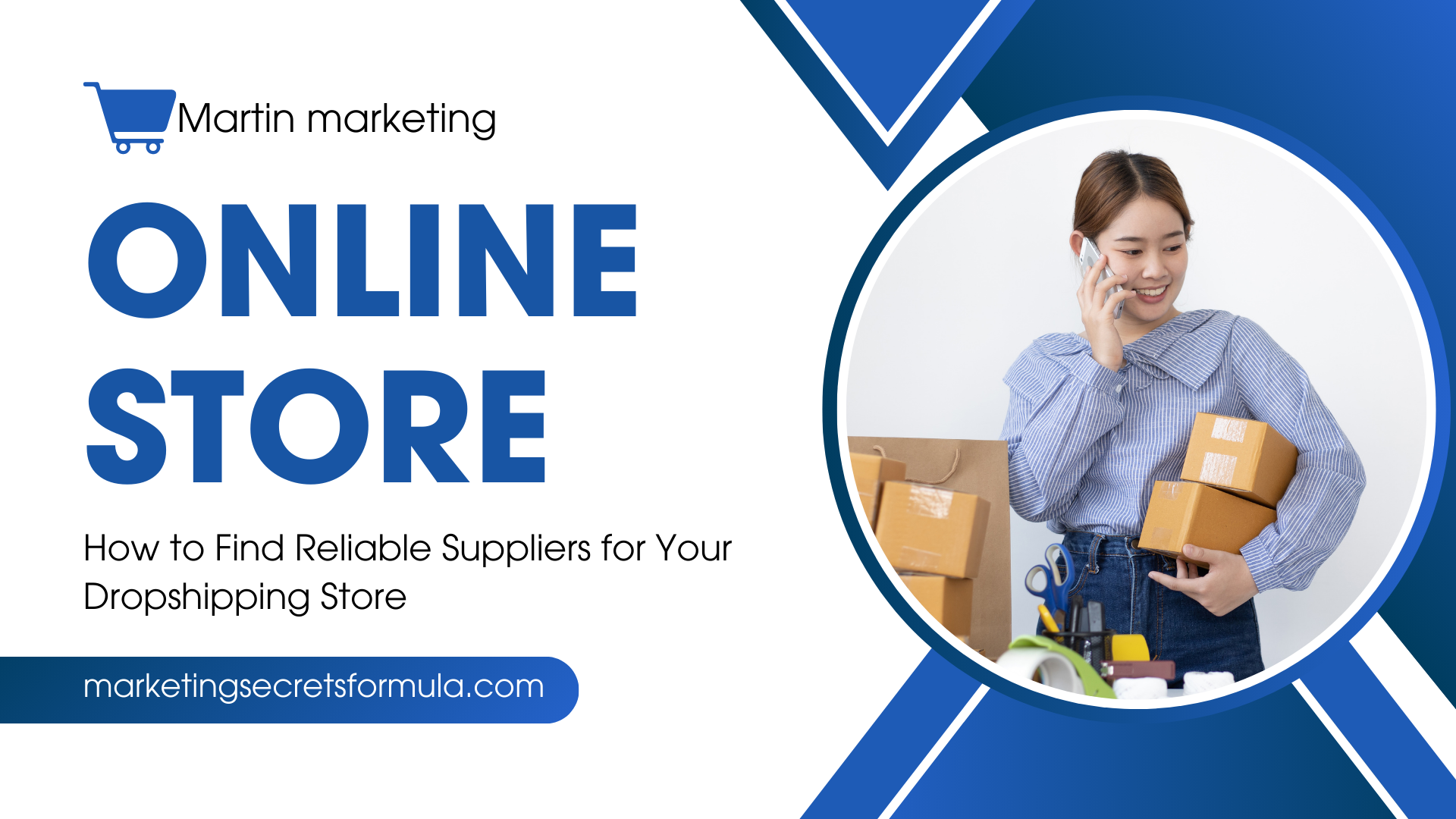Welcome to my article “How to Find Reliable Suppliers for Your Dropshipping Store” In the bustling world of dropshipping, finding the right supplier is like dating for your business—it’s all about finding that perfect match who understands your needs, delivers on promises, and keeps the relationship smooth and stress-free. Just as you wouldn’t settle for a partner who forgets anniversaries and shows up late, you shouldn’t settle for a supplier who delivers shoddy products or, worse, no products at all. Trust me, the last thing you want is a customer asking why their “invisible” sweater hasn’t arrived yet.
But fear not, intrepid entrepreneur! Navigating the maze of potential suppliers doesn’t have to feel like a never-ending episode of a dating reality show. With the right strategies and a bit of know-how, you can pinpoint reliable suppliers who will help your dropshipping business flourish. In this guide, we’ll break down how to find these elusive gems—those suppliers who won’t ghost you when you need them most. From understanding what makes a supplier tick to spotting the red flags that scream “run away,” we’ve got you covered. So buckle up and get ready to transform your dropshipping journey from a nerve-wracking search into a streamlined, successful partnership!
Access My Proven Tested Formula for $50-$100 Daily Income – Watch This FREE Video Now >>>

Understanding the Role of a Supplier in Dropshipping
Picture this: you’re the mastermind behind a fabulous online store, crafting marketing magic and charming customers left and right. But behind the scenes, there’s a crucial partner pulling the strings to make sure everything runs smoothly—your supplier. In the world of dropshipping, the supplier is like the unsung hero of your business, and understanding their role is key to ensuring your store doesn’t end up in a supply chain soap opera.
So, what exactly does a supplier do in dropshipping? Unlike traditional retail, where you stockpile inventory like a squirrel hoarding nuts for winter, a dropshipping supplier keeps the inventory for you. This means they handle everything from storing the products to packing and shipping them directly to your customers. Your job is to market and sell; their job is to make sure that the product your customer ordered isn’t just a mirage but an actual tangible item that arrives at their doorstep.
Now, imagine if your supplier had the customer service skills of a grumpy cat—responses are delayed, products are inconsistent, and your customers are left scratching their heads. It’s not pretty, right? That’s why choosing a supplier who’s reliable, communicative, and efficient is like finding a loyal sidekick who helps you save the day. They’re the ones ensuring that your dreams of a seamless shopping experience become a reality and not a series of customer complaints and refund requests.
Understanding this dynamic is crucial. It’s not just about picking a supplier off a list; it’s about forging a partnership that will either propel your dropshipping store to new heights or leave you tangled in a web of dissatisfaction. So, let’s dive into how to identify the right supplier for your needs and avoid the dreaded pitfalls of a bad partnership!
Where to Search for Reliable Dropshipping Suppliers
Alright, you’ve decided to dive into the dropshipping deep end, and now it’s time to find the unsung heroes who’ll help bring your e-commerce dreams to life. But where do you start your search for reliable suppliers? Think of it like a treasure hunt—except instead of gold coins, you’re hunting for partners who’ll help make your store a smashing success. Grab your virtual map and let’s explore the best places to find those all-important suppliers!
First up, we’ve got the big leagues of dropshipping supplier searches: supplier directories. Websites like SaleHoo, Doba, and Worldwide Brands are like having a VIP pass to a dropshipping party. They offer curated lists of suppliers, so you don’t have to wade through the wild, wild west of the internet alone. It’s like having a trusty guide who knows all the right places to go and the shady spots to avoid.
Next, let’s talk about marketplaces and platforms. AliExpress and Alibaba are like the bustling bazaars of the dropshipping world. They offer a massive variety of products and suppliers from all over the globe. Think of it as an all-you-can-eat buffet of goods, where you can sample different products and find just the right ones to stock your virtual shelves. But beware: quality can be as varied as the dishes at a buffet, so make sure to do your due diligence.
Don’t forget the direct approach. Sometimes, reaching out to manufacturers and wholesalers directly can be a game-changer. They might offer better deals, more reliable products, or even exclusive items that aren’t available through other channels. It’s like getting backstage passes to the concert of your dreams—you get to see what’s behind the scenes and potentially strike up a more personalized deal.
Access My Proven Tested Formula for $50-$100 Daily Income – Watch This FREE Video Now >>>
Finally, industry forums and networks can be gold mines for finding recommendations and insights. Websites like Reddit and Facebook groups are filled with dropshipping veterans who’ve been around the block and have a few supplier stories to share. They might offer you the lowdown on suppliers who are top-notch or steer you away from those that are more trouble than they’re worth.
So, whether you’re scouring directories, exploring marketplaces, reaching out directly, or tapping into industry wisdom, remember that the key is to stay vigilant. Finding a reliable supplier is like finding a good friend—sometimes you have to kiss a few frogs before you find the perfect match. Happy hunting!
Criteria for Evaluating Supplier Reliability
Evaluating supplier reliability—it’s like deciding whether to invite someone to a dinner party or keep them at arm’s length. You wouldn’t want to risk a party-crasher who eats all the hors d’oeuvres and leaves a mess, and similarly, you don’t want a supplier who’s unreliable and potentially disastrous for your dropshipping business. So, what are the key criteria to keep in mind when assessing your potential partners? Let’s break it down with a touch of humor and a whole lot of insight!
1. Product Quality and Variety
First up, let’s talk about the star of the show: the products themselves. You need suppliers who offer high-quality items that will make your customers swoon. Imagine if you were buying a product and it arrived looking like it had a rough night out—scratched, dented, or just plain disappointing. That’s the kind of experience you want to avoid for your customers. Check for product samples if possible and review detailed descriptions. And don’t forget variety—your supplier should offer a range of products that align with your niche, so you’re not left scrambling for new stock every time a trend changes.
2. Shipping Times and Methods
Next on the checklist: shipping times and methods. Think of this as the supplier’s equivalent of a punctuality report card. Are they consistently on time, or do they resemble the friend who always shows up fashionably late? Reliable suppliers should have clear shipping policies and offer reasonable delivery times. They should also provide various shipping options to cater to different customer needs. Fast, reliable shipping isn’t just a nice-to-have; it’s essential for keeping your customers happy and coming back for more.
3. Communication and Customer Service
Good communication is the secret sauce to any successful partnership. You need a supplier who’s responsive and easy to work with—someone who won’t leave you hanging like a bad text message. Evaluate how quickly they respond to inquiries and how effectively they address concerns. A supplier with excellent customer service is like having a dependable friend who’s always there to help when you need it.
4. Pricing and Minimum Order Requirements
Let’s talk money—specifically, pricing and minimum order requirements. You want suppliers who offer competitive prices that allow you to maintain healthy profit margins. Also, check if they have minimum order requirements that fit your budget. A supplier who demands bulk orders that are way beyond your current scale can be a deal-breaker. Flexibility in order sizes can be a sign of a supplier who understands the needs of growing businesses.
5. Reviews and Reputation
Finally, take a good look at reviews and reputation. This is like checking a potential friend’s references before inviting them to your social circle. Read reviews from other dropshippers and look for feedback on forums or social media. A supplier with a solid track record and positive reviews is more likely to be reliable. Watch out for patterns of complaints—repeated issues with quality, service, or shipping are red flags you shouldn’t ignore.
By keeping these criteria in mind, you can sift through potential suppliers like a pro, ensuring that you partner with those who will help your dropshipping business thrive. Remember, a reliable supplier is more than just a vendor—they’re a crucial part of your team. Choose wisely, and you’ll be well on your way to a successful dropshipping adventure!
How to Build and Maintain Strong Relationships with Your Suppliers
Building and maintaining a strong relationship with your suppliers is a bit like nurturing a friendship—if you want it to last, you need to put in some effort and show that you care. Imagine your supplier as your business BFF, someone you need to keep in good spirits to ensure everything runs smoothly. So, how do you foster this relationship and keep it thriving? Let’s dive into the essentials with a sprinkle of humor and practical advice!
1. Communicate Clearly and Consistently
Clear and consistent communication is the cornerstone of any good relationship, and it’s no different with your suppliers. Think of it as sending a friendly text to check in—regular updates and open lines of communication help avoid misunderstandings and keep things running smoothly. Be specific about your needs, provide feedback on orders, and don’t be afraid to ask questions. And, just like you wouldn’t ghost a friend, make sure to respond to their inquiries and updates promptly. Good communication is like the glue that holds your business partnership together.
Access My Proven Tested Formula for $50-$100 Daily Income – Watch This FREE Video Now >>>
2. Negotiate Fair Terms
Negotiation isn’t just about haggling for a better price; it’s about finding a win-win situation that benefits both parties. Approach negotiations with a collaborative mindset rather than a confrontational one. Discuss pricing, order quantities, and any other terms openly. If you’re both on the same page and feel like you’re getting a fair deal, it’s much easier to maintain a positive relationship. Remember, a little compromise can go a long way in building goodwill.
3. Show Appreciation and Respect
Everyone loves to feel appreciated, and suppliers are no exception. Acknowledge their hard work and the value they bring to your business. Whether it’s a thank-you note for a job well done or a little recognition for going above and beyond, showing appreciation can strengthen your bond. Respect their time and expertise, and treat them as partners in your business journey, not just vendors. A little respect and gratitude can turn a good supplier relationship into a great one.
4. Monitor Performance and Provide Feedback
Just like in any healthy relationship, regular check-ins are crucial. Monitor your supplier’s performance to ensure they’re meeting your expectations. If something isn’t quite right, provide constructive feedback rather than just pointing fingers. This helps them understand your needs better and adjust accordingly. Think of it as giving helpful advice to a friend rather than just complaining. Constructive feedback helps both parties improve and grow together.
5. Be Transparent and Honest
Honesty is the best policy, especially when it comes to business relationships. Be transparent about your expectations, potential challenges, and any changes that might affect your orders. If you’re facing a delay on your end or a sudden change in demand, let your supplier know as soon as possible. Transparency helps build trust and prevents surprises that could strain the relationship. After all, honesty fosters a stronger, more resilient partnership.
By following these guidelines, you’ll build a strong, mutually beneficial relationship with your suppliers that will help your dropshipping business thrive. Remember, suppliers are more than just order fulfillers—they’re key partners in your success story. So, invest in the relationship, and you’ll find that a little effort goes a long way in creating a harmonious and productive partnership!
Red Flags to Watch Out For When Choosing a Supplier
Choosing the right supplier for your dropshipping business is like picking a roommate—if you get it wrong, things can get awkward fast. You want someone reliable who won’t leave you hanging or cause unnecessary drama. Unfortunately, not every supplier out there is a gem, and spotting the red flags can save you from a lot of headaches. So, let’s dive into the warning signs that should make you hit the brakes and rethink that supplier relationship!
1. Poor Communication
Imagine trying to organize a dinner party and your guests keep ghosting you. Frustrating, right? That’s how it feels when a supplier doesn’t communicate effectively. If a supplier is slow to respond, gives vague answers, or seems disinterested in your queries, it’s a major red flag. Good suppliers should be as responsive as a well-trained puppy, ready to help you with clear and timely answers. If communication feels like pulling teeth, it might be time to look elsewhere.
2. Inconsistent Product Quality
Picture this: You place an order, and your customers are eagerly awaiting their shiny new gadgets. But when the products arrive, they’re a far cry from what you promised—poor quality, defects, and all. If a supplier’s product quality is inconsistent or questionable, it can lead to customer complaints, returns, and negative reviews. Always check product samples and read reviews from other businesses. If there’s a pattern of quality issues, it’s a sign to steer clear.
3. Lack of Transparency
Transparency is key in any relationship, and suppliers are no exception. If a supplier is cagey about their pricing, hidden fees, or their operational processes, it’s a red flag. Reliable suppliers should be open about their costs, terms, and how they handle orders. If they’re dodging questions or not forthcoming with information, it might be a sign they’re hiding something—or worse, setting you up for unexpected surprises.
4. Negative Reviews and Poor Reputation
Just like you wouldn’t date someone with a sketchy past, you don’t want to partner with a supplier who has a track record of complaints. Check reviews and ratings on supplier directories, forums, and social media. If you find a slew of negative feedback about unreliable service, poor quality, or missed deadlines, it’s worth taking those concerns seriously. A bad reputation can be hard to shake, and you don’t want to be part of a supplier’s ongoing drama.
5. Unreasonable Minimum Order Requirements
Minimum order requirements can be a bit like a bad date that insists on splitting the bill at the most awkward moment. If a supplier demands minimum orders that are way beyond your current needs or budget, it can create unnecessary pressure and financial strain. Look for suppliers who offer flexibility in order sizes and terms. If a supplier’s requirements are rigid and don’t align with your business model, it might be time to explore other options.
6. Lack of Return and Refund Policies
We all hope for smooth sailing, but sometimes things go awry. A supplier without a clear return and refund policy is like a friend who’s always late but never apologizes. If you encounter issues with products or orders, you’ll need to know you can get a resolution. Suppliers should have straightforward policies for returns, refunds, and exchanges. If they don’t, it could mean you’re in for a rough ride when problems arise.
By keeping an eye out for these red flags, you can avoid partnering with suppliers who might cause more trouble than they’re worth. Remember, choosing a supplier is like choosing a business partner—take your time, do your research, and don’t settle for anything less than stellar. Your dropshipping success depends on it!
Conclusion
Well, there you have it—a complete guide to finding and working with reliable suppliers for your dropshipping store. Think of this as your ultimate cheat sheet for avoiding the pitfalls and pitfalls of supplier partnerships. Armed with this knowledge, you’re now ready to navigate the supplier landscape like a pro, ensuring your business runs as smoothly as a well-oiled machine.
Access My Proven Tested Formula for $50-$100 Daily Income – Watch This FREE Video Now >>>
Choosing the right supplier is crucial for the health of your dropshipping business. It’s not just about getting products from point A to point B; it’s about building a partnership that supports your business goals and enhances your customers’ experience. From understanding the vital role suppliers play to spotting red flags and fostering strong relationships, you’ve got all the tools you need to make informed decisions and avoid common pitfalls.
Remember, just as in any great relationship, communication and trust are key. Stay engaged with your suppliers, provide feedback, and keep the lines of communication open. By being proactive and vigilant, you’ll create a solid foundation that supports your business’s growth and keeps your customers happy.
So go forth, brave entrepreneur, and put these strategies into action. With the right suppliers by your side, you’ll be well on your way to dropshipping success. And who knows? With a bit of luck and a lot of diligence, you might even find that your supplier partnership becomes one of the most rewarding relationships in your business journey. Cheers to your future success!
Thanks a lot for reading my article on “How to Find Reliable Suppliers for Your Dropshipping Store” till the end. Hope you’ve helped. See you with another article.










